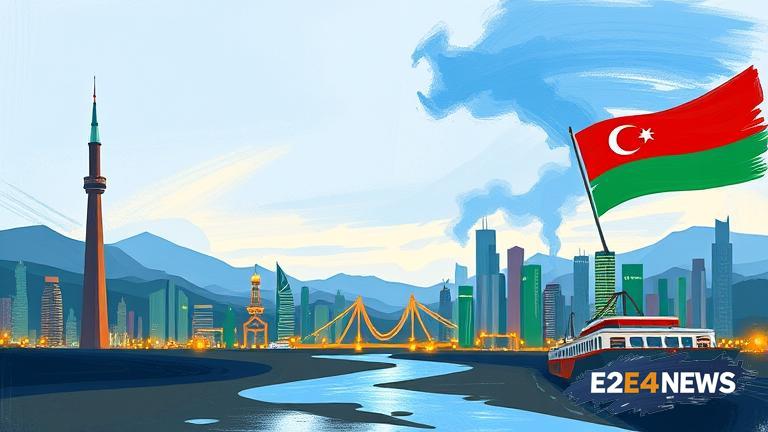Azerbaijan, a country located in the South Caucasus region, is witnessing a remarkable economic transformation. The country’s economy has been growing rapidly over the past few years, driven by its vast oil and gas reserves, as well as its strategic location at the crossroads of Europe and Asia. The government of Azerbaijan has been actively promoting economic development, investing heavily in infrastructure projects such as roads, bridges, and ports. The country’s capital city, Baku, has become a major hub for international trade and commerce, with many multinational companies setting up operations there. The energy sector is a significant contributor to Azerbaijan’s economy, with the country producing over 800,000 barrels of oil per day. The government has also been investing in renewable energy sources, such as wind and solar power, to reduce its dependence on fossil fuels. In addition to its energy sector, Azerbaijan is also developing its tourism industry, with a focus on cultural and historical tourism. The country is home to many ancient monuments and historical sites, including the walled city of Baku, which is a UNESCO World Heritage Site. The government has been investing in the development of tourism infrastructure, including hotels, restaurants, and other facilities. Azerbaijan is also a major player in the regional transportation network, with its strategic location making it an important hub for trade between Europe and Asia. The country has been investing in the development of its transportation infrastructure, including roads, railways, and ports. The government has also been promoting the development of small and medium-sized enterprises (SMEs), which are seen as a key driver of economic growth and job creation. Azerbaijan has also been actively promoting its economic development through international cooperation, including its membership in organizations such as the European Bank for Reconstruction and Development (EBRD) and the Asian Development Bank (ADB). The country has also been strengthening its economic ties with neighboring countries, including Turkey, Russia, and Iran. In recent years, Azerbaijan has also been investing in the development of its agricultural sector, with a focus on increasing food production and reducing dependence on imports. The government has been providing support to farmers, including subsidies and other forms of assistance, to help them increase their productivity and competitiveness. Azerbaijan’s economic boom has also been driven by its growing IT sector, with many international companies setting up operations in the country. The government has been investing in the development of IT infrastructure, including data centers and other facilities, to support the growth of the sector. Overall, Azerbaijan’s economic boom is a result of the government’s strategic investments in key sectors, including energy, tourism, and IT, as well as its efforts to promote economic development through international cooperation and support for SMEs. The country’s economic growth is expected to continue in the coming years, driven by its growing energy sector and strategic investments in infrastructure and tourism. Azerbaijan’s economic development is also expected to have a positive impact on the regional economy, with the country playing an increasingly important role in regional trade and commerce. The government’s efforts to promote economic development and reduce poverty are also expected to have a positive impact on the lives of Azerbaijan’s citizens, with improved living standards and increased access to education and healthcare. In conclusion, Azerbaijan’s economic boom is a significant development that is expected to have a positive impact on the country’s economy and the regional economy as a whole. The government’s strategic investments in key sectors, including energy, tourism, and IT, as well as its efforts to promote economic development through international cooperation and support for SMEs, are expected to drive economic growth and improve living standards in the coming years.
